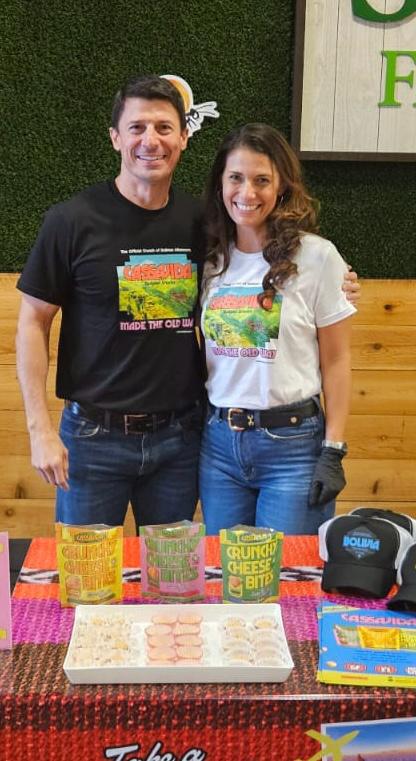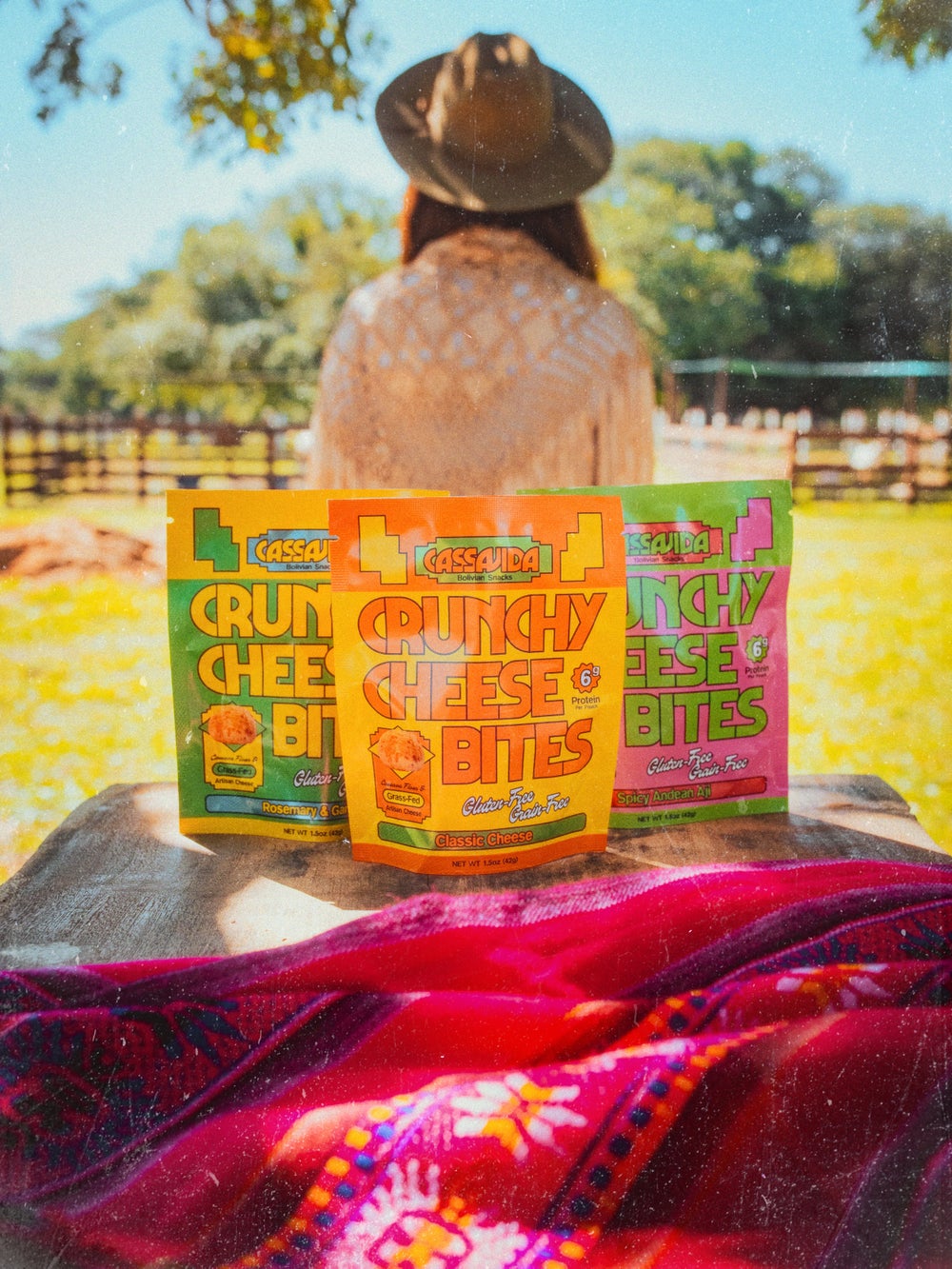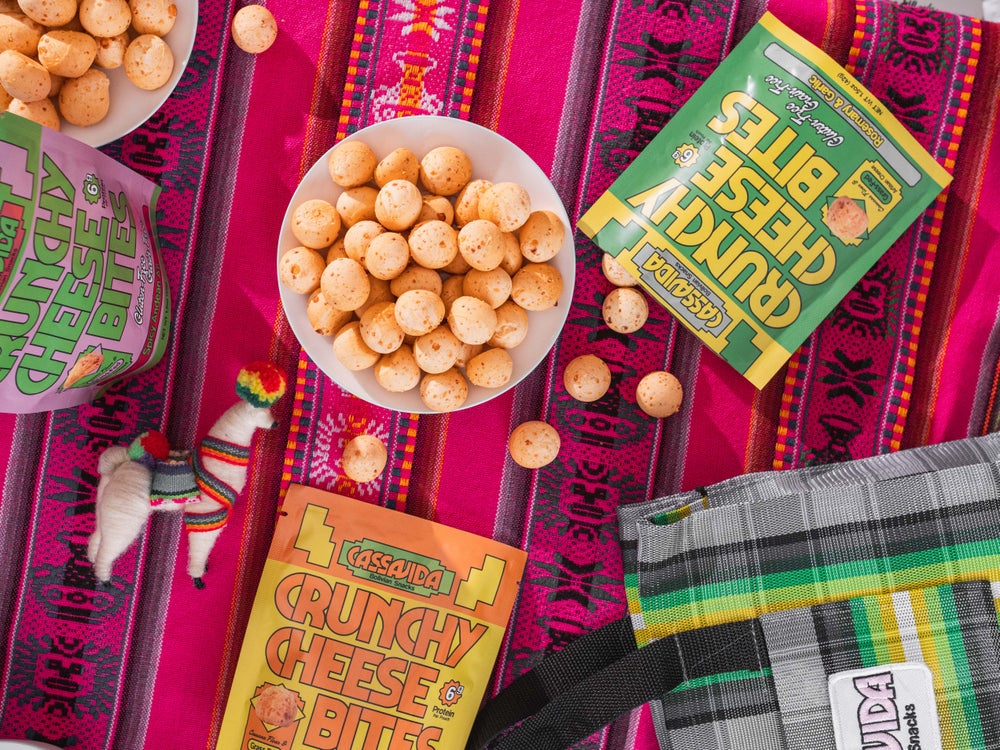Key Takeaways
- The Schenstrom siblings launched their Bolivian snack brand Cassavida as a side hustle in 2021.
- Following a mid-2025 rebrand and entry into Sprouts, the business is eyeing $500,000 revenue for 2026.
This Side Hustle Spotlight Q&A features Carlos Schenstrom, 47, an entrepreneur who splits his time between Miami, Florida and Santa Cruz, Bolivia. Schenstrom and his sister Christina Schenstrom, 42. They are the co-founders of Bolivian snack brand Cassavida, which launched in 2021 and is on track for $150,000 in revenue this year. Responses have been edited for length and clarity.

Image Credit: Courtesy of Cassavida. Carlos and Christina Schenstrom.
Want to read more stories like this? Subscribe to Money Makers, our free newsletter packed with creative side hustle ideas and successful strategies. Sign up here.
When did you start your side hustle, and where did you find the inspiration for it?
We launched Cassavida in 2021, but the idea had been simmering for decades. It actually began back in our college days at the University of Kansas, when we used to talk about how amazing it would be to bring a taste of Bolivia to the U.S.
One snack in particular — cuñapés, a cheesy, crunchy, naturally gluten-free bite made from cassava and artisan cheese — always felt like a perfect fit for American consumers.
Related: Her $4,000-a-Month Side Hustle Landed in Home Depot: ‘Not Bad for a Niche Product’
When the pandemic hit and life slowed down, we finally had the time to revisit those old dreams that had been buried under daily routines. Cassavida was one of them. We had zero experience in CPG, and even less in the U.S. food market, but we decided to start anyway.
For us, Cassavida became more than a snack brand — it was a way to share Bolivia’s rich, often overlooked culinary heritage with the world.

What were some of the first steps you took to get your side hustle off the ground? How much investment did it take to launch?
We had absolutely no experience in CPG or snack manufacturing — let alone in the brutally competitive U.S. market. So our first move was to look for advisors in the U.S. who could help us understand the industry and guide us on where to start. Branding was our entry point.
Initially, we invested around $200,000, but by 2023, we realized that wouldn’t be enough. Having started businesses before, I knew that the real cost of launching a company usually exceeds your first budget — and I was right.
In our third year, we decided to rebrand with Dayjob, a California-based agency known for its work with emerging food brands like David’s Bar. Later that year, we made another big leap: building our own manufacturing facility in Bolivia.
In total, we’ve invested just under $1 million to bring Cassavida to life.
Are there any free or paid resources that have been especially helpful for you in starting and running this business?
Our biggest resource has been people.
We made it a habit to meet as many industry professionals as possible — even those we didn’t immediately need. Maybe you don’t need a fractional CFO right away, but meeting one early helps you understand what to expect when the time comes.
We take notes, gather insights and learn from every conversation. Over time, that collective knowledge has become one of our most valuable tools. When you’re finally ready to hire or partner strategically, you make those decisions from a place of understanding — not urgency.
If you could go back in your business journey and change one thing to save time, energy or headaches, what would it be?
We would have spent more time learning about the CPG world before jumping in. Early on, we hired consultants too quickly because we felt unprepared — but in hindsight, a bit more research and self-education would have gone a long way.
Starting with “just a product” because it seemed like a good idea led us into a long (and expensive) learning curve. In today’s market, a product isn’t enough. You have to know your why — and once you do, your how becomes much clearer.
Our rebranding process with Dayjob was transformative in that sense. Through deep conversations, we uncovered what truly drives us: becoming the unofficial food tourism board of Bolivia — awakening pride at home and curiosity abroad.
Related: Sisters’ Savory Side Hustle Averages $7,000 a Month: ‘Reward We Didn’t Feel in a Corporate Job’
When it comes to this specific business, what is something you’ve found particularly challenging or surprising that people who get into this type of work should be prepared for, but likely aren’t?
As with most startups, focus is everything — and also the hardest thing to maintain. In CPG, you’re constantly seeing other brands trying different strategies, which makes it easy to second-guess your own. We’ve learned that you must take the time early on to clearly define your strategy and then commit to it.
In this industry, we believe that success comes from going narrow and deep — not wide and shallow. That means starting in one specific region, working closely with retailers that truly fit your product and brand, and building strong sales velocities there before expanding. Many new brands rush to get into as many stores as possible, but that can be risky and costly. Remember: Large retailers and category buyers still profit even if they discontinue you after a year — but you lose. So be selective, strategic and laser-focused on where and how you grow.
Can you recall a specific instance when something went very wrong — and how you fixed it?
One of our biggest early challenges came when we landed a major order from an airline for a new package size we had never produced before. The deadline was tight, and instead of asking for more time, we took a leap and accepted the order.
Everything that could go wrong, did — our packaging printer was delayed, our new equipment still had kinks, and the team was under enormous pressure to deliver on time. We managed to fulfill the order, but the experience taught us a valuable lesson: Growth opportunities should never come at the cost of your team’s well-being or your brand’s integrity.
Afterward, we sat down to review every process, celebrated and rewarded our team for going above and beyond, and established clearer limits on what we can realistically commit to. Now, we see challenges as chances to grow — but only if they align with our long-term vision and capacity.
Related: I Turned a Side Hustle Into $20,000 a Month — Working Part-Time Without a College Degree
How long did it take you to see consistent revenue, and how much has the business earned?
We relaunched as Cassavida in mid-2025 following a full rebrand and our entry into Sprouts’ Innovation program. Prior to this, annual sales were under $50,000. This year marks our first period of consistent monthly revenue, with over $100,000 generated so far and projected to close the year around $150,000. We see this as a strong foundation for scaling as we expand across Southern California and online channels. With new doors opening in 2025 — like Sprouts, Mothers Market and our broader expansion plan in Southern California — we’re aiming for $500,000 in revenue for 2026.

How much time do you spend working on your business?
Cassavida is now a full-time focus for both of us. I dedicate the majority of my week to the business, structuring my days into focused blocks for production, marketing, operations and strategic planning.
I also maintain a small portion of time for other ventures, which are supported by strong teams, allowing me to efficiently manage them without diverting attention from Cassavida. This setup lets me bring experience and perspective from other industries while remaining fully committed to scaling our brand.
Christina is now dedicated full-time to brand strategy, marketing, and PR.
Every week we both also dedicate time for learning and industry networking — reading, listening to podcasts and meeting with CPG professionals — so that each decision we make is informed and strategic.
What do you enjoy most about running this business?
The challenge! Starting a new business from scratch — especially in an industry where I had no prior experience — has been incredibly demanding. During discouraging moments, I remind myself how much I’ve learned and how far we’ve come. Seeing our product on the shelves of major U.S. retailers like Sprouts is extremely rewarding.
Being the first Bolivian brand with a snack in a major U.S. retailer nationwide is not only huge for us, but also for other Bolivian entrepreneurs. We hope it inspires others to believe their products can make it to major U.S. shelves as well.
Related: This Mom’s ‘Scrappy’ Side Hustle Started in Her Garage — Now It Makes $5 Million a Year
What is your best piece of specific, actionable business advice?
Focus on self-reflection and understanding yourself. This mindset is critical because starting a business is both financially and emotionally challenging, especially in the beginning. You must know how you’ll react under pressure and plan accordingly — running out of either financial or emotional resources can sink your business before it even has a chance to grow.
If you cultivate the right mindset and anticipate obstacles, you’ll be better equipped to overcome challenges and learn from every experience.


